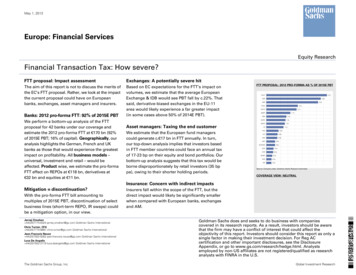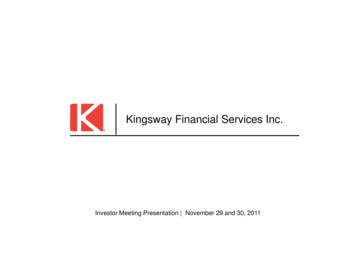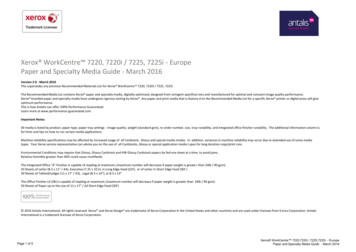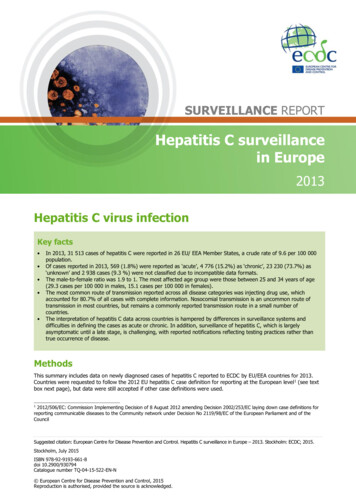
Transcription
May 1, 2013Europe: Financial ServicesEquity ResearchFinancial Transaction Tax: How severe?FTT proposal: Impact assessmentExchanges: A potentially severe hitThe aim of this report is not to discuss the merits ofthe EC’s FTT proposal. Rather, we look at the impactthe current proposal could have on Europeanbanks, exchanges, asset managers and insurers.Based on EC expectations for the FTT’s impact onvolumes, we estimate that the average EuropeanExchange & IDB would see PBT fall by c.22%. Thatsaid, derivative-biased exchanges in the EU-11area would likely experience a far greater impact(in some cases above 50% of 2014E PBT).Banks: 2012 pro-forma FTT: 92% of 2015E PBTWe perform a bottom-up analysis of the FTTproposal for 42 banks under our coverage andestimate the 2012 pro-forma FTT at 170 bn (92%of 2015E PBT; 16% of capital). Geographically, ouranalysis highlights the German, French and UKbanks as those that would experience the greatestimpact on profitability. All business models –universal, investment and retail – would beaffected. Product wise, we estimate the pro-formaFTT effect on REPOs at 118 bn, derivatives at 32 bn and equities at 11 bn.FTT PROPOSAL: 2012 PRO-FORMA AS % OF 2015E .4xRBS1.3xBARC1.3xBAPOAsset managers: Taxing the end customerWe estimate that the European fund managerscould generate c. 17 bn in FTT annually. In turn,our top-down analysis implies that investors basedin FTT member countries could face an annual taxof 17-23 bp on their equity and bond portfolios. Ourbottom-up analysis suggests that this tax would beborne disproportionately by retail investors (35 bppa), owing to their shorter holding 6xBCP0.5xPOP0.5xBMPS0.4xSAN0.4xISP0.4xSource: Company data, Goldman Sachs Research estimatesCOVERAGE VIEW: NEUTRALInsurance: Concern with indirect impactsMitigation discontinuation?With the pro-forma FTT bill amounting tomultiples of 2015E PBT, discontinuation of selectbusiness lines (short-term REPO, IR swaps) couldbe a mitigation option, in our view.Jernej Omahen 44(20)7774-6324 jernej.omahen@gs.com Goldman Sachs InternationalChris Turner, CFA 44(20)7774-8867 chris.turner@gs.com Goldman Sachs InternationalJean-Francois Neuez 44(20)7552-9362 jean-francois.neuez@gs.com Goldman Sachs InternationalLuca De Angelis 44(20)7552-3719 luca.deangelis@gs.com Goldman Sachs InternationalThe Goldman Sachs Group, Inc.Insurers fall within the scope of the FTT, but thedirect impact would likely be significantly smallerwhen compared with European banks, exchangesand AM.Goldman Sachs does and seeks to do business with companiescovered in its research reports. As a result, investors should be awarethat the firm may have a conflict of interest that could affect theobjectivity of this report. Investors should consider this report as only asingle factor in making their investment decision. For Reg ACcertification and other important disclosures, see the DisclosureAppendix, or go to www.gs.com/research/hedge.html. Analystsemployed by non-US affiliates are not registered/qualified as researchanalysts with FINRA in the U.S.Global Investment Research
May 1, 2013Europe: Financial ServicesTable of contentsOverview: The European FTT: How severe?3Overview of the FTT proposal: A tough proposal, with a tight implementation timeline8Banks: FTT’s significant impact on European banks stretched across products & countries16Annual FTT rates for key product groups: Multiples of headline rate18Estimating 2012 pro-forma FTT: 170 bn for banks under analysis25Valuation: A 10% weighting for FTT implementation reduces market value by 7 ppt36Appendix 1: Pro-forma 2012 FTT impact by bank, split by product38Appendix 2: Pro-forma 2012 FTT by bank, split by product type, relative to 2015E PBT40European exchanges & IDBs: The FTT represents a significant potential risk44Asset managers: Potential impact of a Financial Transaction Tax52Insurers: Less likely to be affected, but indirect impacts a concern66Disclosure Appendix70Goldman Sachs Global Investment Research2
May 1, 2013Europe: Financial ServicesOverview: The European FTT: How severe?Current proposal of the FTT: Implementation targeted for January 1, 2014The Financial Transaction Tax is a complex measure, proposed by the European Commission (specifically, the Directorate Generalfor Taxation and Customs Union (DG Tax)) that has a stated aim to: (1) harmonize legislation on indirect financial taxation within theEU-11, (2) ensure that financial institutions make their fair contribution to the cost of the recent crisis and (3) reduce externalities ofthe financial system on financial stability and wealth redistribution.The Commission itself estimates that the proposal could result in some 75% reduction in derivative volumes and a 15% reduction incash volumes. The Commission also estimates that following these volume adjustments, the FTT would yield a 34 bn tax revenue.The targeted time-line to implementation is tight. The votes by the European Parliament and the European Council are expected totake place this spring. This is to be followed by transposition of the FTT into national law, currently planned by September 30. It is atthis stage that key details, such as those relating to collection and payment, are expected to be set. The FTT is planned forimplementation as of January 1, 2014, under the current proposal.Banks: FTT’s significant impact on European banks stretched across products and countriesWe show that the annual FTT rates are substantially higher than the proposed headline rates of 0.1% for cash and 0.01% forderivative transactions would suggest. This is especially true for shorter-term transactions, where the FTT would offset the expectedbenefit (be it funding or hedging) many times over. We show that, as a consequence of the FTT, the REPO market 12 months,interest rate swaps 6 months, and market making would likely be significantly impaired. The “post FTT” economics of theseactivities could result in far-reaching mitigation actions by banks (such as substantial downsizing/closure of these business lines).The knock-on effects could vary from reduced credit availability and increased pricing (and thus an impact on the credit quality ofbanks), to reduced ability to hedge risks (and thus a higher volatility threshold for banks/corporates) and disruption of fundingmarkets.Exhibit 1: GS covered banks: Severe implications, REPOsmost impacted Pro-forma FTT impact by product on GS covered banks, 2012Exhibit 2: with scope to alter profitability profilesPro-forma FTT as % 2015E PBT GS covered banks, non EU-11in black3.7x 118bn2.1x1.0x0.9x0.3x0.3x0.2x0.2xAUSIRLGoldman Sachs Global Investment Research0.3xNORSource: EC, Company data, Goldman Sachs Research estimatesUKOtherITAOther FixedIncomeSUIGovernment LiabilitiesPaper 0bnBENEquities 2bnFRADerivatives 3bnGERREPOs 4bn0.5xESP 11bnPOR0.6x 32bnSource: EC, Company data, Goldman Sachs Research estimates3
May 1, 2013Europe: Financial ServicesOn a 2012 pro-forma basis, the FTT would amount to 170 bn (or 92% of 2015E PBT) for the 42 European banks we have analyzed,on our estimates. By affected balance sheet category, the bulk of the impact stems from the European banks’ REPO books ( 118 bn),followed by derivatives ( 32 bn), equities ( 11 bn) and government bond books ( 4 bn). By bank, the impact extends acrossbusiness models – investment, universal, global and domestic retail banks. Similarly, by geography, it has a reach well beyond theEU-11. Indeed, we show some of the most affected banks would be those in the UK and Switzerland.Individually, we show that the most affected banks are the French and German institutions. The six French and German banks showa 2012 pro-forma FTT as a percentage of 2015E PBT ranging from 168% (BNP), up to 362% (DBK) and finally 423% (Natixis). But evenpure-play retail lenders – the Italian/Spanish domestic banks for example – stand to be significantly impacted (16%-130% of 2015E PBT).In our view, the pro-forma 2012 FTT effect is significant enough to make certain business lines, and funding avenues, no longerviable for a large number of European institutions. If implemented, a major restructuring of funding and business models wouldlikely be necessary. Given the magnitude of the possible impact, we believe the FTT could still be subject to substantial modificationbefore it is passed, and ultimately, implemented.Diversified Financials: A significant potential risk to European exchanges & IDBsMaterial volume declines are a policy objective. The European Commission itself expects the FTT to reduce derivative volumesby 75% and to lower trading volumes in equities and bonds by 15%. We believe it is important to note that a material reduction involumes is a stated policy objective of the FTT, rather than an unintended consequence of the tax. On the basis that exchanges &interdealer brokers are (to a lesser or greater degree) ‘volume dependent’ businesses, the FTT therefore constitutes a direct risk tothe sector’s earnings.Significant reduction in profits is a potential outcome. Based on the Commission’s volume expectations, we estimate that theaverage European Exchange & IDB under our coverage would see pre-tax profits decline by 22% as a result of the tax. Exchangesthat are based outside the FTT area and are biased towards cash instruments would be least impacted (we estimate a small 2%reduction in PBT for the Warsaw Exchange) while derivative-biased exchanges in the FTT area would likely experience a far greaternegative impact. Our analysis suggests that Deutsche Börse would see the largest impact to earnings, with a potential 51%reduction in our forecast pre-tax profits for 2014 (before any mitigating actions by management).Although we would expect the larger variable costs of the IDBs to help offset some of the decline in volumes, we nonethelessestimate that ICAP and Tullett Prebon could see pre-tax profits decline by 16% and 26% respectively as a result of the tax.Insurance: Less likely to be affected, but indirect impacts are a concernWhile European insurers fall within the scope of the European FTT, we believe that the proposals would have a significantly smallerdirect impact on the sector compared with banks or exchanges. The overarching aim of the FTT appears to be to encourage longterm investing, and insurers have always maintained that they are “buy and hold” investors. However, we believe the investmentstrategies of insurers could be altered by the FTT, which may result in weaker risk management and lower investment returns,particularly for insurers domiciled in countries not signed up to the FTT. Costs are likely to rise for insurers domiciled in countriesthat fall under the scope of the FTT and we expect this to be ultimately passed on to savers and pensioners. We also believe that theFTT could cause a decline in asset prices and creditworthiness of other financial institutions, which could have a significant impacton the insurance sector.Goldman Sachs Global Investment Research4
May 1, 2013Europe: Financial ServicesExhibit 3: Pro-forma 2012 FTT effect is large and broad, when analyzed in the context of European bank profitability2012 pro-forma FTT for GS covered banks as % of 2015E al Tax BillAssetsTotalGvt.BondsOth. Fixed IncomeEquitiesOtherTotalLiabilitiesTotalErste 0%0%1%0%2%12%30%Danske Bank33%15%48%9%0%3%0%0%3%0%3%61%BNP Paribas52%52%104%39%4%1%17%0%22%3%25%168%Credit 82%160%342%31%0%8%26%0%35%15%50%423%Societe Generale70%62%132%35%4%2%31%1%38%6%44%211%Deutsche k196%123%319%37%3%2%18%0%23%2%25%381%Bank Of Ireland4%6%11%8%0%0%0%0%0%0%0%19%Intesa 6%41%Banco Popolare61%61%123%0%3%1%2%0%6%1%7%130%UBI Banca9%9%17%0%0%0%1%0%1%1%2%19%BP Milano6%6%12%3%0%0%1%0%1%0%1%16%ING to Santo FG2%3%5%1%6%3%11%0%19%0%19%25%Banco ixaBank6%7%13%4%0%0%0%0%1%0%1%17%Banco Swedbank7%3%10%3%0%1%0%0%2%0%2%15%Source: Company data, Goldman Sachs Research estimates.Goldman Sachs Global Investment Research5
May 1, 2013Europe: Financial ServicesExhibit 3 cont'd: Profitability within – and outside – the EU-11 stands to be significantly impacted2012 pro-forma FTT for GS covered banks as % of 2015E al Tax BillAssetsTotalGvt.BondsOth. Fixed IncomeEquitiesOtherTotalLiabilitiesTotalCredit %1%6%1%9%1%10%77%Julius Baer8%2%10%1%0%0%2%1%3%0%3%14%EFG %1%19%Standard lREPOs120%TradingRegionDerivativesTotal Tax BillAssetsTotalGvt.BondsOth. Fixed %1%1%1%0%3%0%4%52%Total35%29%
Goldman Sachs Global Investment Research 4 On a 2012 pro-forma basis, the FTT would amount to 170 bn (or 92% of 2015E PBT) for the 42 European banks we have analyzed, on our estimates.











